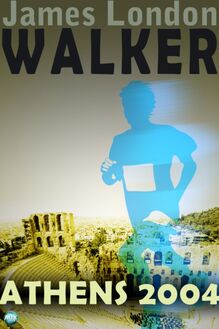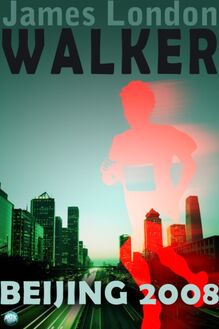Walker , livre ebook
123
pages
English
Ebooks
2014
Vous pourrez modifier la taille du texte de cet ouvrage
Obtenez un accès à la bibliothèque pour le consulter en ligne En savoir plus
Découvre YouScribe et accède à tout notre catalogue !
Découvre YouScribe et accède à tout notre catalogue !
123
pages
English
Ebooks
2014
Vous pourrez modifier la taille du texte de cet ouvrage
Obtenez un accès à la bibliothèque pour le consulter en ligne En savoir plus
Publié par
Date de parution
24 juin 2014
Nombre de lectures
1
EAN13
9781781661482
Langue
English
Title Page
WALKER: ATHENS 2004
by
James London
Publisher Information
Walker: Athens 2004 published in 2012 by
Andrews UK Limited
www.andrewsuk.com
This book is sold subject to the condition that it shall not, by way of trade or otherwise, be lent, resold, hired out or otherwise circulated without the publisher’s prior written consent in any form of binding or cover other than that in which it is published, and without a similar condition being imposed on the subsequent purchaser.
The characters and situations in this book are entirely imaginary and bear no relation to any real person or actual happening.
Copyright © 2012 James London
The right of James London to be identified as author of this book has been asserted in accordance with section 77 and 78 of the Copyrights Designs and Patents Act 1988.
Chapter 1
“Bentley, you’re a disgrace,” shouted a threatening London accent from the midst of a pack of two hundred supporters and reporters assembled to watch and report on the 100 metres men’s sprint final at the 2003 World Athletics Championship in Paris - a year prior to what was expected to be the greatest Olympics of the modern era in Athens in 2004. They had returned at early morning to stand in silence listening to the Chairman of the World Championship Committee confirm that Bentley had tested positive for Nandralone, at +200 times the normal level. The Brits screamed derision and hatred like a lynch mob.
It was fifteen years since Ben Johnson’s disqualification in the 1988 Olympic 100-metre final, and anything like this had happened at a major world athletics championship.
“Haven’t these guys learned by now?” said an American journalist, “or at least found a way of cheating and not being caught,” he went on.
“Now the Brits are at the bottom of the pile,” said his friend.
“They’ll destroy the seedlings from which athletes grow if something isn’t done.”
“When will they learn that cheats don’t win?” continued the first guy.
“Sometimes they do,” said his friend.
I knew that too, and so did Bentley. But it didn’t alter the fact that this disaster wasn’t just Bentley’s, it was also the entire British team’s and as the American had put it.
“The Brits are at the bottom of the pile.”
At least he hadn’t denied the finding of the testers like every other athlete with a plus 200 Nandrolone reading had always done. Yesterday, I had reported for the Telegraph Bentley’s unexpected victory and predicted him as a future Olympic champion. This morning, he was a disgraced athlete whose career was ended having achieved nothing.
This huge gathering of reporters and supporters had been attracted by speculation and rumours during the night over Bentley’s post race drug test. At 8.00 p.m. after sending off my report on the day’s performances, the press office received an unconfirmed report that a sprinter had tested positive. The report had circulated like rumours do, so that by 7.00 a.m. there were 200 Athletics press, officials and supporters gathered inside and outside the testing headquarters at the Stade de France in a northern suburb of Paris. The British 100-metre runner, David Bentley, came into the packed foyer of the testing centre, flanked by three French officials. He stood, as he had on the winner’s rostrum, as alone as he had raced out of the starting blocks at the sound of the gun, silent. How desperate he will have felt. After a sleepless night of emotional pain, here he was to face the music and a punishment that many would think would far outweigh the crime.
“I have nothing to say”, was all he said, to a barrage of questions that followed the findings of the International Athletics Committee. Amidst abuse and anger, he eased his way to a side exit, and into a waiting car that drove him away to anonymity and the everlasting loneliness of the disgraced athlete.
I had already alerted my sports editor, Jack Galloway, that Bentley had been asked to the stadium at 8.00 a.m. When I spoke to him the previous evening, he seemed to know already, so I agreed to report again after this momentous meeting, which I did. Bentley was officially disqualified, returned his gold medal, made his “I have nothing to say” comment to the world’s press and TV, and departed Paris.
“We have to do something, before it’s too late and before the Olympics in Athens, next August,” said Jack, knowing that unless something dramatic was done this would drag on in the world’s sports press all through the build up to the Games. In truth, all that could be done in the time left, exactly one year, was to limit the damage.
“Stay in Paris for two days and report on the reaction of the foreign press. By then, I will be ready,” he said. So I stayed and covered every nasty report on Bentley.
Jack had appointed me to athletics because he loved the sport and I was his protégé. This business with Bentley disgraced the sport he’d spent his life ennobling, lifting the athlete above the ordinary, compensating for their sometimes lack of worldly wisdom, and education; placing them on pedestals above their achievements, building their confidence, and rounding them into people who had futures with families, and in modern times, fortunes to invest, living comfortably, and anticipating that one day they would give something back to the sport. He’d done for them, what he was doing for me as a sports journalist. He knew the athletics clubs where the coaches and athletes experimented with substances, trying to find an undetectable mix of banned substances that worked, succeeding until they became over confident or made one careless mistake. Jack never let it dampen his endeavour or spoil his lifelong ideals and love for athletics.
After two days reporting on the press’ condemnation of another cheating athlete, I resented Bentley’s actions at these championships. In a pre-Olympic year, we feared a repeat of Seoul in Athens, especially as four months earlier, new revelations had come to light that in the run-up to the US Olympic trials in 1988, Carl Lewis, an 8 time Olympic gold medallist had been a performance enhancing drug abuser. The British athletes would not talk; they were traumatised and frightened. It was a bad experience for a team where 99% of athletes were clean. Now a nervousness about testing had crept in. The British Amateur Athletic Authorities were nowhere to be seen, the athletes were on their own, like Bentley, without coach, manager, or BAAA representative to support them. It was their view that only the ill advised or the foolish got caught, and they didn’t want to be associated with either. The mauling for Bentley and the British team came principally from the entire foreign press. Russia, Switzerland and France particularly took revenge against the ‘holier than thou’ Brits, after years of their occupation of the moral high ground.
For me, athletics was becoming an ordeal. I couldn’t see a happy future reporting on it. Anything was better than working on something blessed with the kiss of death, even if it meant missing a month at the Olympics in Athens in August 2004.
Rugby, immediate and exciting, was my game but the papers’ coverage was already intense with six reporters during the winter sports season doing nothing else. It was disproportionate, but the Telegraph readership demanded it. Rugby wasn’t Jack’s game; nobody played rugby in Bermondsey, where he was brought up. Soccer was his game and Millwall was his team. He left rugby to Selwyn Jones, Gareth Morgan, Evan Hughes, and the others who’d played for Pontypool at various times a couple of decades ago when the famous Pontypool front row had dominated the Welsh international game. I’d have done anything to join the rugby reporting team.
Archer had selected from dozens of Oxbridge applicants for junior sports reporter on the paper. After two interviews with personnel, the third, the one that mattered, was with Jack. In 2001, they’d hired four junior reporters, one in sports, and Archer had got it. He didn’t know why. Perhaps it was his aggressive manner, and that he liked to call the shots. It was probably that Jack liked him.
Wigan was where, as a schoolboy aged 15, he’d run a 12.0 second 100 metres to win the under-16 100 metres All-England Schoolboy Final at Crystal Palace. After that, he had played rugby union on the wing for Orrell and as an amateur for Wigan Rugby League, who at that time were the best rugby league club in the world. They offered him good money to become a professional, and if he thought he could have made it to the top in League or Union, he’d have taken it. He didn’t believe he was physically or intellectually suited to become a professional sportsman.
He’d been adopted at 12 weeks and his childhood, with his adopted parents, had been extremely happy. The love he had for his adopted parents had never created the desire to seek out his real mother or to learn of the circumstances involved with her decision to let him be adopted. To his mum, Iris and dad, Ted, he had been a gift from God. He had grown up with their values, which he lived by and they had loved him, as he loved them.
She had taught him to read books. She’d once been on an Arvon writers’ course in Yorkshire to learn how to write books, but she never did. He had taught him to play rugby.
Jack could not understand why Archer never wanted to know about his real parents.
“I’ve got everything, they may have nothing. Why should I invade their privacy, embarrass them, or destroy something they have. One day I might get a call,” he said to Jack, who’d guessed that rejection lingered somewhere in Archer.
Archer always gave of his best so he never felt any obligation to be grateful to his employers. What he earned he deserved and although he’d challenge Jack’s viewpoint on most things


